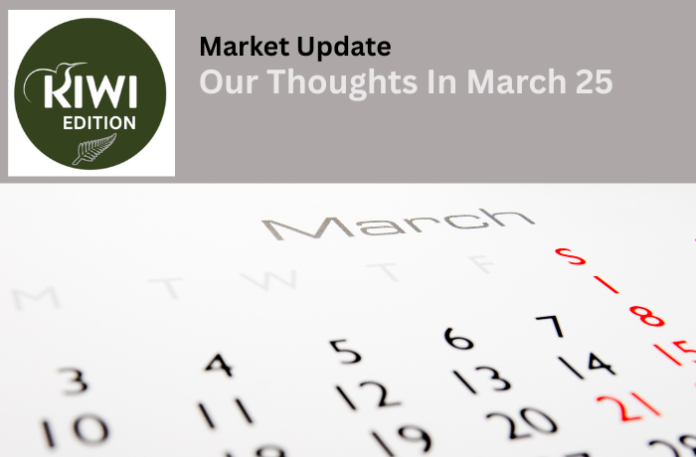There’s been lots of mixed messages around the economy in the last month, and the volatility has been talked about quite a bit but I guess we need to put this in context a little bit to how it affects the Kiwi homeowner.
The volatility at the moment is more of an international trend. While it’s affecting many of our investments and the New Zealand dollar is jumping around a bit, the internal economy is fairly stable at the moment.
There has been some good news on the economic front, with a lot of economists and even the International Monetary Fund now saying they believe that New Zealand’s economy has turned the corner. We’re looking at some modest growth this year, and that should improve in 2026.
So if the economy is turning the corner, then maybe we will not see interest rates decrease much more.
Let’s Talk About Home Loans
The good news was home loan rates dropped in February, as they were predicted to do.
The banks did jump on board straight away, reducing their floating interest rates, but they were a little bit slower to realign their fixed interest rates and there’s still a bit of movement happening as the banks look to try to get a bigger share of the market.
We’re still expecting to see interest rates drop a bit more with the expectation that we will see a 0.25% drop in April and likely another 0.25% drop a little later. While we always welcome interest rate drops, we don’t think there’ll be a lot more than this unless something dramatic happens. So that will probably mean that our fixed interest rates will settle in at about 0.50% less that we have today in the range of 4.50% – 5.50% depending on the term that you fix for.
But it’s always important to remember that New Zealand is a very small economy, and so we are at the mercy of what happens around the world and that does mean that there is always a risk of our interest rates increasing too.
We’re therefore suggesting that people no longer wait for interest rate drops. If you’re really looking for certainty, then revert to a strategy which includes using fixed rates over the longer term.
Do You Have A Mortgage Strategy?
So, what is a mortgage strategy?
The first two things you need to do when you’re setting up a mortgage strategy are to understand exactly how much money you’re going to pay to the bank.
Then, you need to look at the home loan that you have and ask yourself if it is the best home loan to have.
You want a home loan that allows you the flexibility that you need to ensure that you can pay your mortgage off faster, but not put you and your family into a situation where one little thing might go wrong, and all of a sudden you’re struggling to pay your mortgage.
In New Zealand the banks are very poor at explaining what makes a good mortgage. The reality is they probably don’t know or really don’t want you to have too much control of your own finances.

Let’s think about what is important.
What are the important features that your mortgage needs to have to give you the ability to have the right strategy?
Firstly, you need to be able to pay more. We know that in New Zealand our fixed-term home loans have lower interest rates than the floating options; however, when you use a fixed rate you lose the flexibility that you would have if your loan was floating. Therefore, the number one criteria that we look for in home loans is the ability to pay extra on a fixed loan.
We want to be able to pay more than the standard repayment, but also be able to revert back to the standard repayment should something go wrong. The flexibility to increase and decrease the repayments is critical as it allows you to push to pay it off faster, but if you push that a little bit too far or if something changes, you know you have the ability to reduce the payments back down to something that remains affordable for you.
A lot of the home loans in New Zealand allow you to increase the payments a little bit, but they don’t allow you to decrease the payments again. This means that people do not make the effort to pay too much more, as they don’t want to end up in a financial situation where those higher repayments put them into financial hardship.
We also like people to have some form of emergency savings. What most people tend to do is have that in some savings account making very little interest but at least it gives them the comfort that they can access the money if needed. Our preference when we’re setting up a mortgage strategy is to have those funds invested into the mortgage – so you’re saving more without any tax implications, and you can still access that money for an emergency as required.
Finally, let’s keep an eye on the next OCR announcement on the 9th April.




